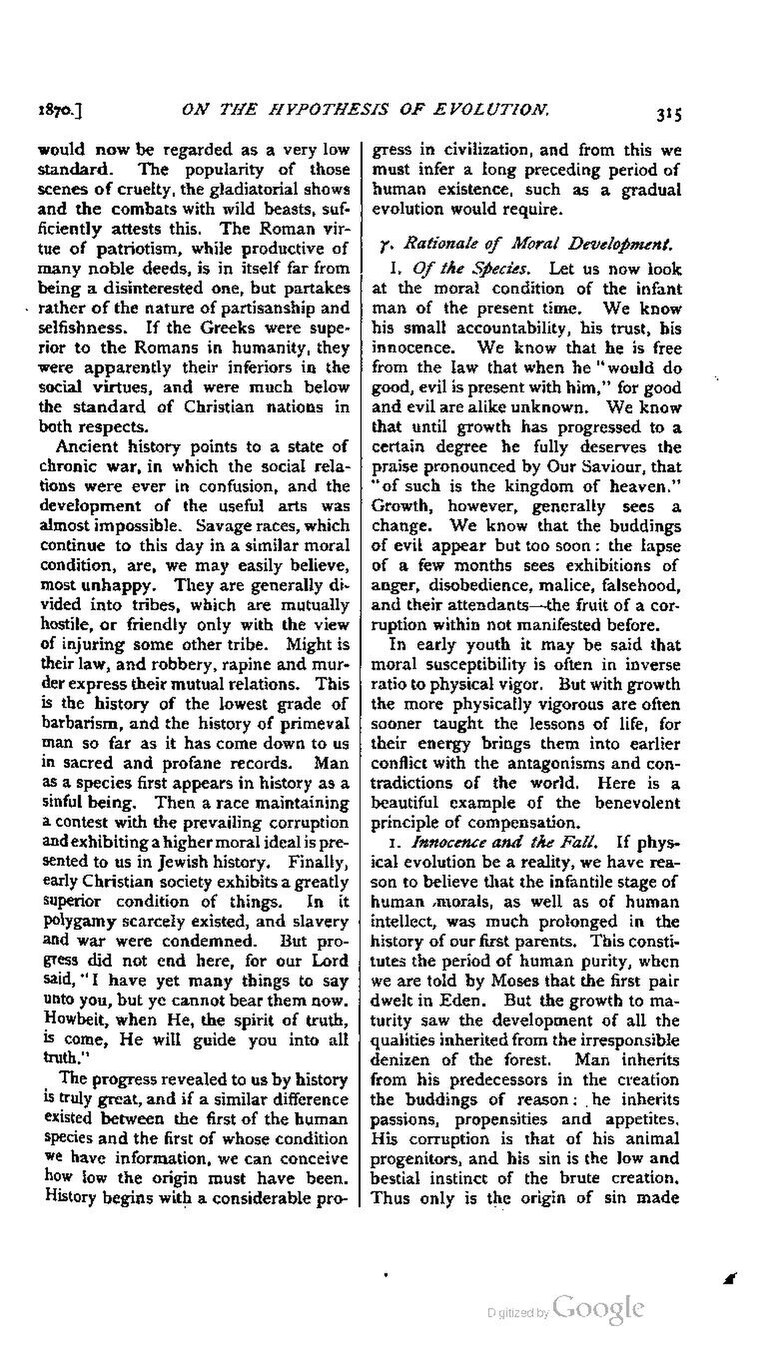would now be regarded as a very low standard. The popularity of those scenes of cruelty, the gladiatorial shows and the combats with wild beasts, sufficiently attests this. The Roman virtue of patriotism, while productive of many noble deeds, is in itself far from being a disinterested one, but partakes rather of the nature of partisanship and selfishness. If the Greeks were superior to the Romans in humanity, they were apparently their inferiors in the social virtues, and were much below the standard of Christian nations in both respects.
Ancient history points to a state of chronic war, in which the social relations were ever in confusion, and the development of the useful arts was almost impossible. Savage races, which continue to this day in a similar moral condition, are, we may easily believe, most unhappy. They are generally divided into tribes, which are mutually hostile, or friendly only with the view of injuring some other tribe. Might is their law, and robbery, rapine and murder express their mutual relations. This is the history of the lowest grade of barbarism, and the history of primeval man so far as it has come down to us in sacred and profane records. Man as a species first appears in history as a sinful being. Then a race maintaining a contest with the prevailing corruption and exhibiting a higher moral ideal is presented to us in Jewish history. Finally, early Christian society exhibits a greatly superior condition of things. In it polygamy scarcely existed, and slavery and war were condemned. But progress did not end here, for our Lord said, "I have yet many things to say unto you, but ye cannot bear them now. Howbeit, when He, the spirit of truth, is come, He will guide you into all truth."
The progress revealed to us by history is truly great, and if a similar difference existed between the first of the human species and the first of whose condition we have information, we can conceive how low the origin must have been. History begins with a considerable progress in civilization, and from this we must infer a long preceding period of human existence, such as a gradual evolution would require.
γ. Rationale of Moral Development.
I. Of the Species. Let us now look at the moral condition of the infant man of the present time. We know his small accountability, his trust, his innocence. We know that he is free from the law that when he "would do good, evil is present with him," for good and evil are alike unknown. We know that until growth has progressed to a certain degree he fully deserves the praise pronounced by Our Saviour, that "of such is the kingdom of heaven." Growth, however, generally sees a change. We know that the buddings of evil appear but too soon: the lapse of a few months sees exhibitions of anger, disobedience, malice, falsehood, and their attendants—the fruit of a corruption within not manifested before.
In early youth it may be said that moral susceptibility is often in inverse ratio to physical vigor. But with growth the more physically vigorous are often sooner taught the lessons of life, for their energy brings them into earlier conflict with the antagonisms and contradictions of the world. Here is a beautiful example of the benevolent principle of compensation.
1. Innocence and the Fall. If physical evolution be a reality, we have reason to believe that the infantile stage of human morals, as well as of human intellect, was much prolonged in the history of our first parents. This constitutes the period of human purity, when we are told by Moses that the first pair dwelt in Eden. But the growth to maturity saw the development of all the qualities inherited from the irresponsible denizen of the forest. Man inherits from his predecessors in the creation the buddings of reason: he inherits passions, propensities and appetites. His corruption is that of his animal progenitors, and his sin is the low and bestial instinct of the brute creation. Thus only is the origin of sin made
